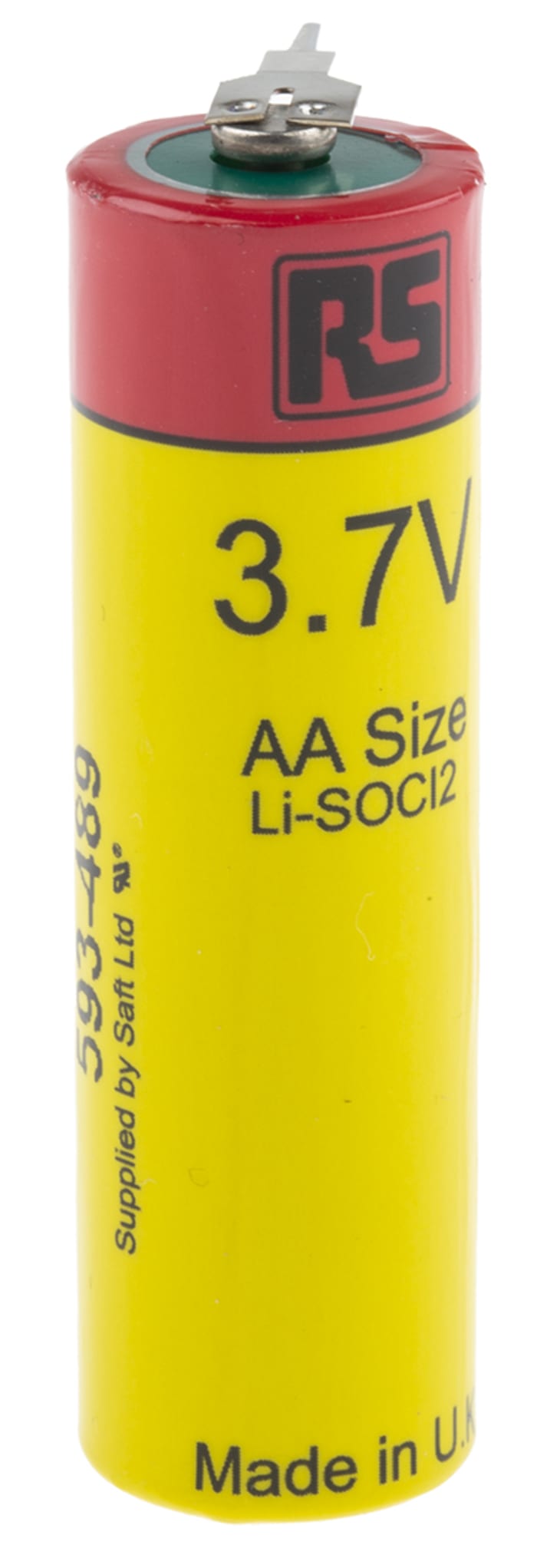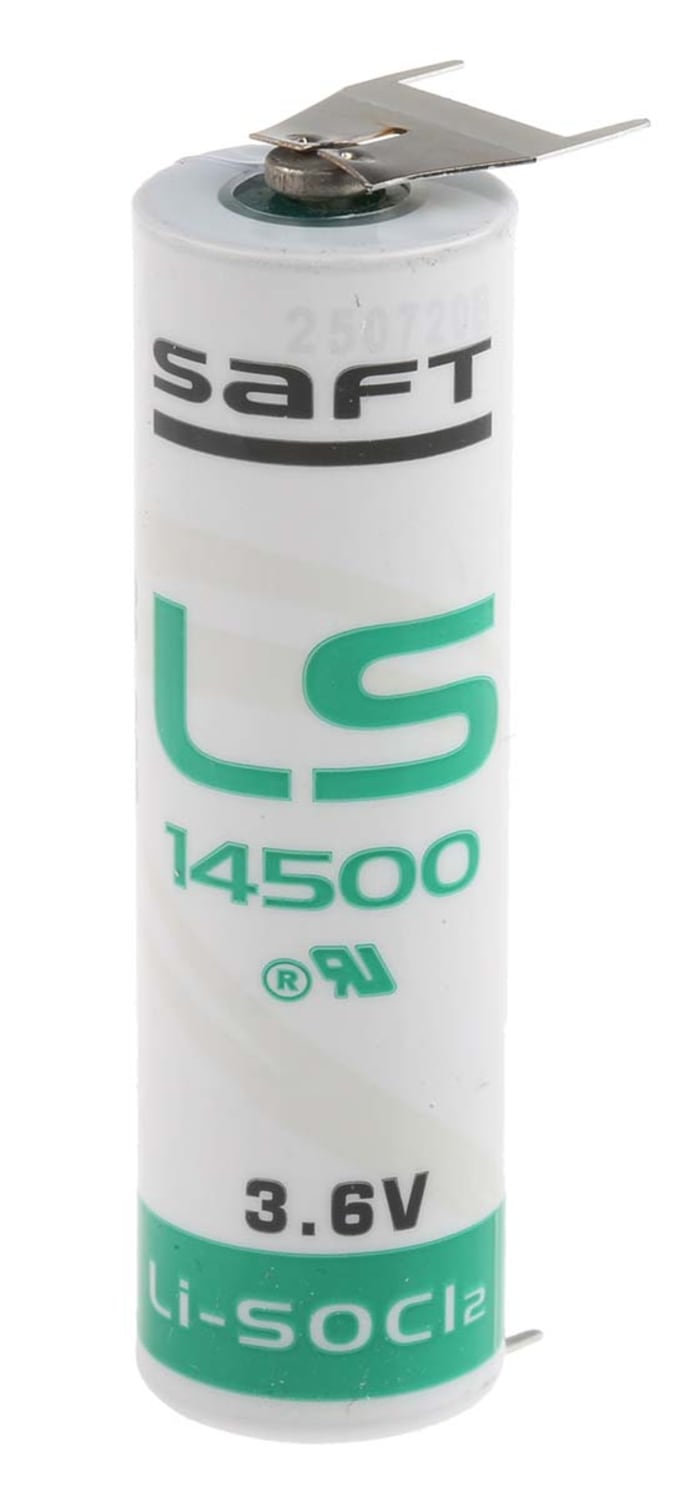Technical documents
Specifications
Brand
TadiranChemistry
Lithium Thionyl Chloride
Nominal Voltage
3.6V
Terminal Type
PCB Pin
Capacity
2.4Ah
Size
AA
Country of Origin
Germany
Product details
Tadiran 3.6 V Lithium Thionyl Chloride Batteries
3.6V Lithium batteries from Tadiran, designed for use in applications where a device is used for a long period of time such as utility meters, security devices and computer RAMS and clocks. These batteries are free from heavy materials, offers a unique construction making them safe and environmentally friendly.
Lithium batteries what are the advantages?
• Nominal voltage of 3.6 V, greater than conventional cells
• Wide temperature range −55゚C to +85゚C
• High energy density, the highest of any primary battery
Features and Benefits
• Lithium Thionyl Chloride
• AA, 1/ 2 AA, 2/3 AA
• Greater energy density
• Higher capacity
• Environmentally friendly
• PCB Mounting
• Long-term shelf life and reliability
Options
• 1/ 2 AA; Polarised Tags = RS stock no: 526-8447
• 2/ 3 AA; Tagged = RS stock no: 526-8453
• AA; PCB Pin = RS stock no: 526-8469
Typical Applications
Lithium batteries are used in electronic devices that require a small, compact source of power. Example applications include:
• Utility Meters
• Smoke detectors
• Alarm systems
FAQ’s
Are Lithium Batteries Harmful?
Lithium batteries can sometimes leak a substance called potassium hydroxide which is a caustic agent that can cause eye, skin and respiratory irritations. This risk is reduced by not mixing different manufacturer battery types, batteries of different chemistries and by the replacement of all batteries at the same time.
How to dispose of Alkaline/Lithium Batteries?
Recycle responsibly, a wide range of schemes are available.
Safety Advice
Keep out of sight and reach of children
Guidance:
• Always install the batteries correctly as per instruction
• Ensure that the contact points are clean and conductive
• Do not mix different types of battery
• Do not heat or attempt to recharge the battery
• Do not dispose of in a fire
€ 14.60
€ 14.60 Each (ex VAT)
1
Please note: Hazardous items will incur an additional delivery charge and have a much longer lead time. Please contact us for further details.
€ 14.60
€ 14.60 Each (ex VAT)
Stock information temporarily unavailable.
1
Please note: Hazardous items will incur an additional delivery charge and have a much longer lead time. Please contact us for further details.
Stock information temporarily unavailable.
Technical documents
Specifications
Brand
TadiranChemistry
Lithium Thionyl Chloride
Nominal Voltage
3.6V
Terminal Type
PCB Pin
Capacity
2.4Ah
Size
AA
Country of Origin
Germany
Product details
Tadiran 3.6 V Lithium Thionyl Chloride Batteries
3.6V Lithium batteries from Tadiran, designed for use in applications where a device is used for a long period of time such as utility meters, security devices and computer RAMS and clocks. These batteries are free from heavy materials, offers a unique construction making them safe and environmentally friendly.
Lithium batteries what are the advantages?
• Nominal voltage of 3.6 V, greater than conventional cells
• Wide temperature range −55゚C to +85゚C
• High energy density, the highest of any primary battery
Features and Benefits
• Lithium Thionyl Chloride
• AA, 1/ 2 AA, 2/3 AA
• Greater energy density
• Higher capacity
• Environmentally friendly
• PCB Mounting
• Long-term shelf life and reliability
Options
• 1/ 2 AA; Polarised Tags = RS stock no: 526-8447
• 2/ 3 AA; Tagged = RS stock no: 526-8453
• AA; PCB Pin = RS stock no: 526-8469
Typical Applications
Lithium batteries are used in electronic devices that require a small, compact source of power. Example applications include:
• Utility Meters
• Smoke detectors
• Alarm systems
FAQ’s
Are Lithium Batteries Harmful?
Lithium batteries can sometimes leak a substance called potassium hydroxide which is a caustic agent that can cause eye, skin and respiratory irritations. This risk is reduced by not mixing different manufacturer battery types, batteries of different chemistries and by the replacement of all batteries at the same time.
How to dispose of Alkaline/Lithium Batteries?
Recycle responsibly, a wide range of schemes are available.
Safety Advice
Keep out of sight and reach of children
Guidance:
• Always install the batteries correctly as per instruction
• Ensure that the contact points are clean and conductive
• Do not mix different types of battery
• Do not heat or attempt to recharge the battery
• Do not dispose of in a fire




